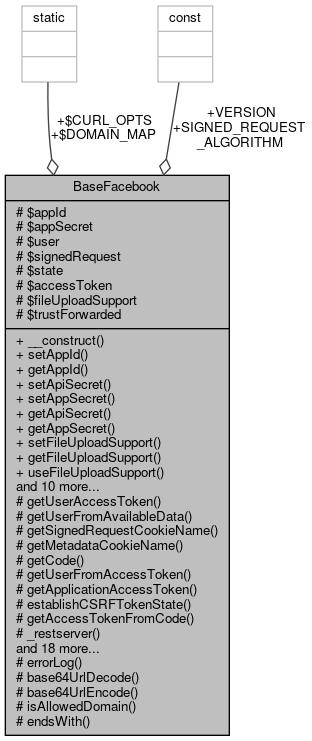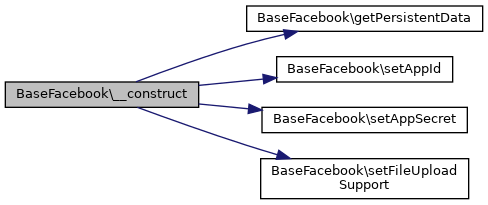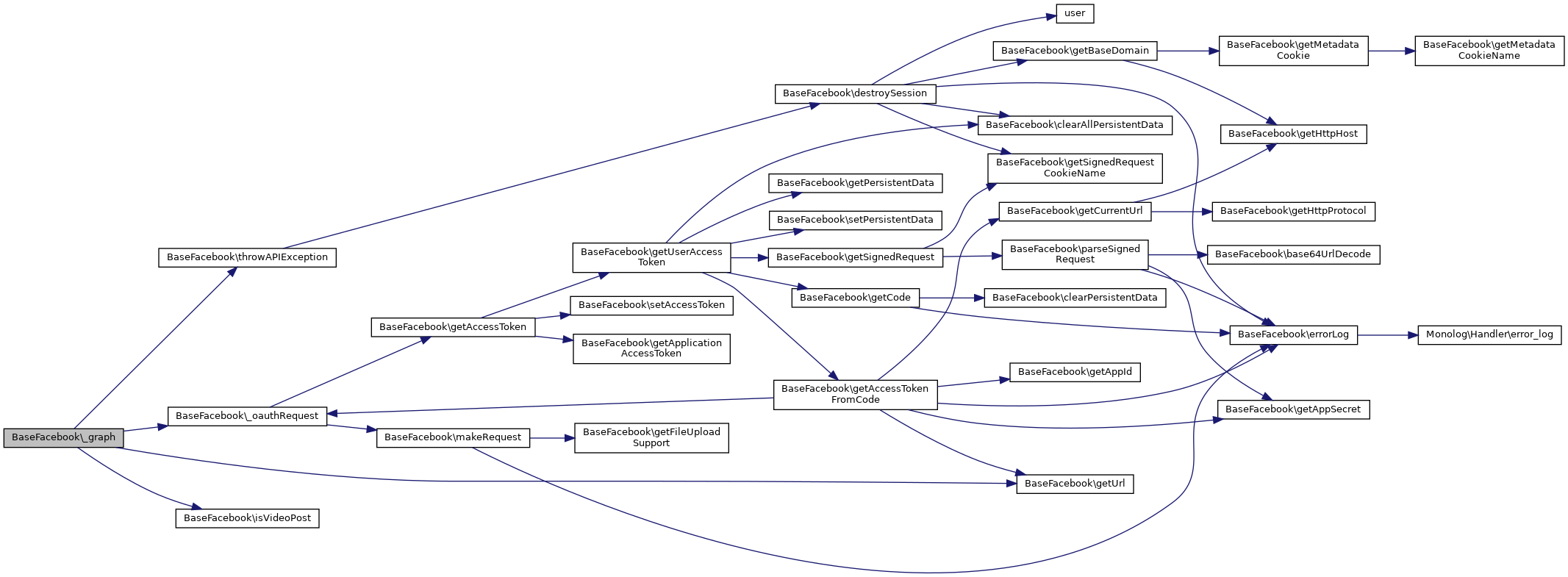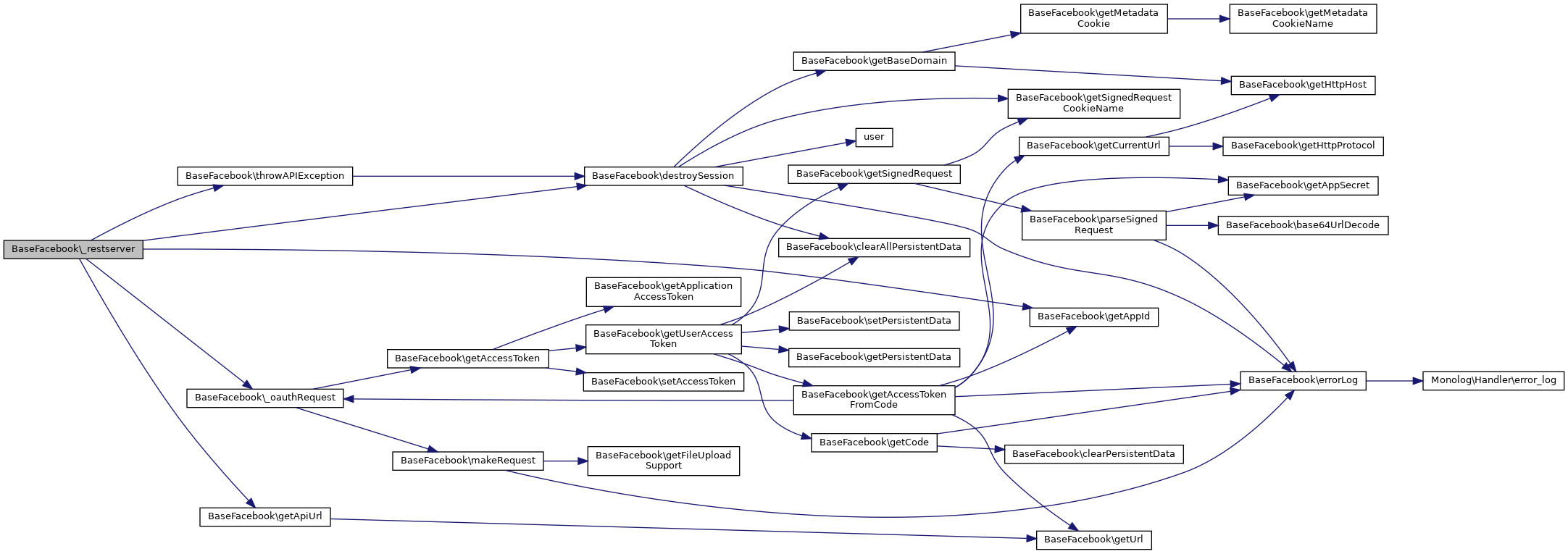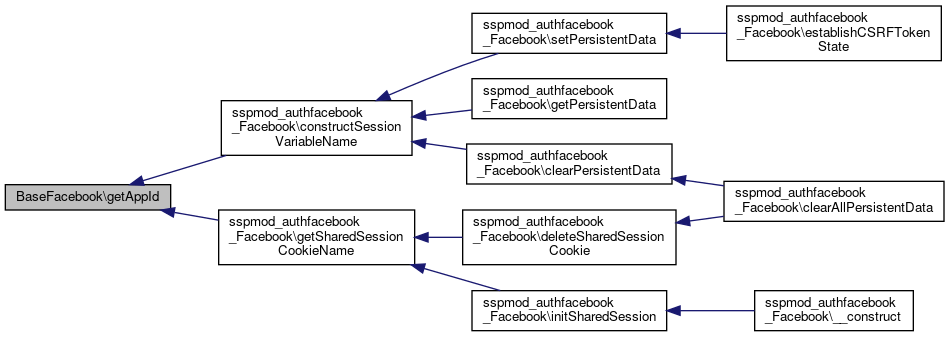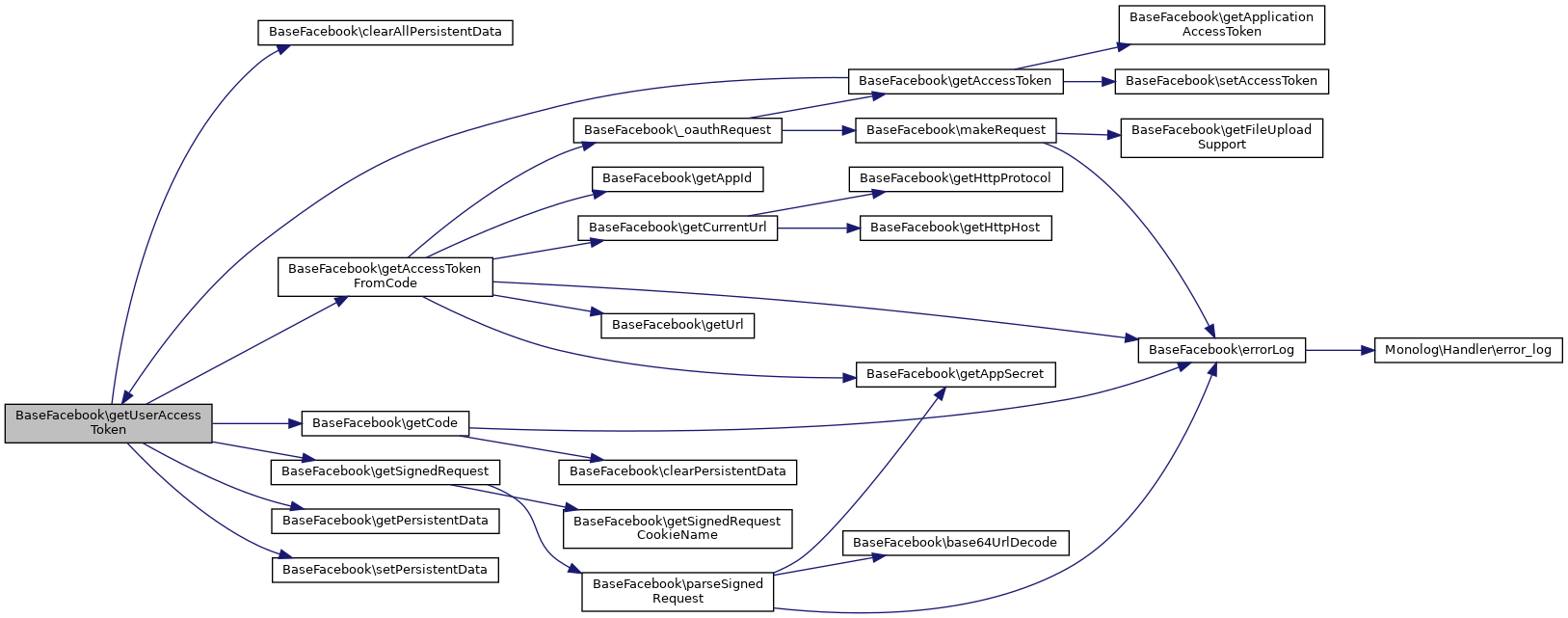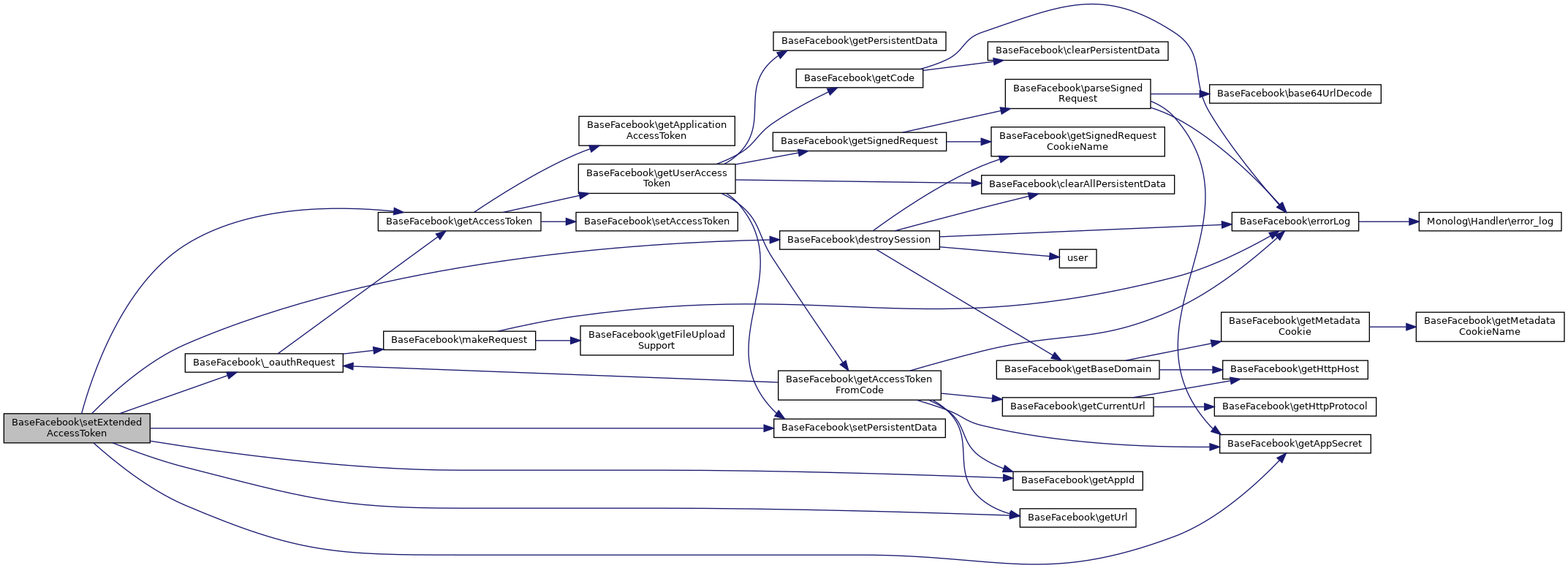Provides access to the Facebook Platform. More...
 Inheritance diagram for BaseFacebook:
Inheritance diagram for BaseFacebook: Collaboration diagram for BaseFacebook:
Collaboration diagram for BaseFacebook:Public Member Functions | |
| __construct ($config) | |
| Initialize a Facebook Application. More... | |
| setAppId ($appId) | |
| Set the Application ID. More... | |
| getAppId () | |
| Get the Application ID. More... | |
| setApiSecret ($apiSecret) | |
| Set the App Secret. More... | |
| setAppSecret ($appSecret) | |
| Set the App Secret. More... | |
| getApiSecret () | |
| Get the App Secret. More... | |
| getAppSecret () | |
| Get the App Secret. More... | |
| setFileUploadSupport ($fileUploadSupport) | |
| Set the file upload support status. More... | |
| getFileUploadSupport () | |
| Get the file upload support status. More... | |
| useFileUploadSupport () | |
| DEPRECATED! Please use getFileUploadSupport instead. More... | |
| setAccessToken ($access_token) | |
| Sets the access token for api calls. More... | |
| setExtendedAccessToken () | |
| Extend an access token, while removing the short-lived token that might have been generated via client-side flow. More... | |
| getAccessToken () | |
| Determines the access token that should be used for API calls. More... | |
| getSignedRequest () | |
| Retrieve the signed request, either from a request parameter or, if not present, from a cookie. More... | |
| getUser () | |
| Get the UID of the connected user, or 0 if the Facebook user is not connected. More... | |
| getLoginUrl ($params=array()) | |
| Get a Login URL for use with redirects. More... | |
| getLogoutUrl ($params=array()) | |
| Get a Logout URL suitable for use with redirects. More... | |
| getLoginStatusUrl ($params=array()) | |
| Get a login status URL to fetch the status from Facebook. More... | |
| api () | |
| Make an API call. More... | |
| destroySession () | |
| Destroy the current session. More... | |
Data Fields | |
| const | VERSION = '3.2.2' |
| Version. More... | |
| const | SIGNED_REQUEST_ALGORITHM = 'HMAC-SHA256' |
| Signed Request Algorithm. More... | |
Static Public Attributes | |
| static | $CURL_OPTS |
| Default options for curl. More... | |
| static | $DOMAIN_MAP |
| Maps aliases to Facebook domains. More... | |
Protected Member Functions | |
| getUserAccessToken () | |
| Determines and returns the user access token, first using the signed request if present, and then falling back on the authorization code if present. More... | |
| getUserFromAvailableData () | |
| Determines the connected user by first examining any signed requests, then considering an authorization code, and then falling back to any persistent store storing the user. More... | |
| getSignedRequestCookieName () | |
| Constructs and returns the name of the cookie that potentially houses the signed request for the app user. More... | |
| getMetadataCookieName () | |
| Constructs and returns the name of the coookie that potentially contain metadata. More... | |
| getCode () | |
| Get the authorization code from the query parameters, if it exists, and otherwise return false to signal no authorization code was discoverable. More... | |
| getUserFromAccessToken () | |
| Retrieves the UID with the understanding that $this->accessToken has already been set and is seemingly legitimate. More... | |
| getApplicationAccessToken () | |
| Returns the access token that should be used for logged out users when no authorization code is available. More... | |
| establishCSRFTokenState () | |
| Lays down a CSRF state token for this process. More... | |
| getAccessTokenFromCode ($code, $redirect_uri=null) | |
| Retrieves an access token for the given authorization code (previously generated from www.facebook.com on behalf of a specific user). More... | |
| _restserver ($params) | |
| Invoke the old restserver.php endpoint. More... | |
| isVideoPost ($path, $method='GET') | |
| Return true if this is video post. More... | |
| _graph ($path, $method='GET', $params=array()) | |
| Invoke the Graph API. More... | |
| _oauthRequest ($url, $params) | |
| Make a OAuth Request. More... | |
| makeRequest ($url, $params, $ch=null) | |
| Makes an HTTP request. More... | |
| parseSignedRequest ($signed_request) | |
| Parses a signed_request and validates the signature. More... | |
| makeSignedRequest ($data) | |
| Makes a signed_request blob using the given data. More... | |
| getApiUrl ($method) | |
| Build the URL for api given parameters. More... | |
| getUrl ($name, $path='', $params=array()) | |
| Build the URL for given domain alias, path and parameters. More... | |
| getHttpHost () | |
| getHttpProtocol () | |
| getBaseDomain () | |
| Get the base domain used for the cookie. More... | |
| getCurrentUrl () | |
| Returns the Current URL, stripping it of known FB parameters that should not persist. More... | |
| throwAPIException ($result) | |
| Analyzes the supplied result to see if it was thrown because the access token is no longer valid. More... | |
| getMetadataCookie () | |
| Parses the metadata cookie that our Javascript API set. More... | |
| setPersistentData ($key, $value) | |
| Each of the following four methods should be overridden in a concrete subclass, as they are in the provided Facebook class. More... | |
| getPersistentData ($key, $default=false) | |
| Get the data for $key, persisted by BaseFacebook::setPersistentData() More... | |
| clearPersistentData ($key) | |
| Clear the data with $key from the persistent storage. More... | |
| clearAllPersistentData () | |
| Clear all data from the persistent storage. More... | |
Static Protected Member Functions | |
| static | errorLog ($msg) |
| Prints to the error log if you aren't in command line mode. More... | |
| static | base64UrlDecode ($input) |
| Base64 encoding that doesn't need to be urlencode()ed. More... | |
| static | base64UrlEncode ($input) |
| Base64 encoding that doesn't need to be urlencode()ed. More... | |
| static | isAllowedDomain ($big, $small) |
| static | endsWith ($big, $small) |
Protected Attributes | |
| $appId | |
| $appSecret | |
| $user | |
| $signedRequest | |
| The data from the signed_request token. More... | |
| $state | |
| A CSRF state variable to assist in the defense against CSRF attacks. More... | |
| $accessToken = null | |
| $fileUploadSupport = false | |
| $trustForwarded = false | |
Detailed Description
Provides access to the Facebook Platform.
This class provides a majority of the functionality needed, but the class is abstract because it is designed to be sub-classed. The subclass must implement the four abstract methods listed at the bottom of the file.
Definition at line 118 of file base_facebook.php.
Constructor & Destructor Documentation
◆ __construct()
| BaseFacebook::__construct | ( | $config | ) |
Initialize a Facebook Application.
The configuration:
- appId: the application ID
- secret: the application secret
- fileUpload: (optional) boolean indicating if file uploads are enabled
- Parameters
-
array $config The application configuration
Definition at line 215 of file base_facebook.php.
References $config, $state, getPersistentData(), setAppId(), setAppSecret(), and setFileUploadSupport().
 Here is the call graph for this function:
Here is the call graph for this function:Member Function Documentation
◆ _graph()
|
protected |
Invoke the Graph API.
- Parameters
-
string $path The path (required) string $method The http method (default 'GET') array $params The query/post data
- Returns
- mixed The decoded response object
- Exceptions
-
FacebookApiException
Definition at line 852 of file base_facebook.php.
References PHPMailer\PHPMailer\$params, $path, $result, _oauthRequest(), getUrl(), isVideoPost(), and throwAPIException().
 Here is the call graph for this function:
Here is the call graph for this function:◆ _oauthRequest()
|
protected |
Make a OAuth Request.
- Parameters
-
string $url The path (required) array $params The query/post data
- Returns
- string The decoded response object
- Exceptions
-
FacebookApiException
Definition at line 889 of file base_facebook.php.
References $key, PHPMailer\PHPMailer\$params, $url, getAccessToken(), and makeRequest().
Referenced by _graph(), _restserver(), getAccessTokenFromCode(), and setExtendedAccessToken().
 Here is the call graph for this function:
Here is the call graph for this function: Here is the caller graph for this function:
Here is the caller graph for this function:◆ _restserver()
|
protected |
Invoke the old restserver.php endpoint.
- Parameters
-
array $params Method call object
- Returns
- mixed The decoded response object
- Exceptions
-
FacebookApiException
Definition at line 801 of file base_facebook.php.
References PHPMailer\PHPMailer\$params, $result, _oauthRequest(), destroySession(), getApiUrl(), getAppId(), and throwAPIException().
Referenced by api().
 Here is the call graph for this function:
Here is the call graph for this function: Here is the caller graph for this function:
Here is the caller graph for this function:◆ api()
| BaseFacebook::api | ( | ) |
Make an API call.
- Returns
- mixed The decoded response
Definition at line 639 of file base_facebook.php.
References _restserver().
Referenced by getUserFromAccessToken().
 Here is the call graph for this function:
Here is the call graph for this function: Here is the caller graph for this function:
Here is the caller graph for this function:◆ base64UrlDecode()
|
staticprotected |
Base64 encoding that doesn't need to be urlencode()ed.
Exactly the same as base64_encode except it uses
- instead of + _ instead of / No padded =
- Parameters
-
string $input base64UrlEncoded string
- Returns
- string
Definition at line 1253 of file base_facebook.php.
References $input.
Referenced by parseSignedRequest().
 Here is the caller graph for this function:
Here is the caller graph for this function:◆ base64UrlEncode()
|
staticprotected |
Base64 encoding that doesn't need to be urlencode()ed.
Exactly the same as base64_encode except it uses
- instead of + _ instead of /
- Parameters
-
string $input string
- Returns
- string base64Url encoded string
Definition at line 1266 of file base_facebook.php.
References $input.
Referenced by makeSignedRequest().
 Here is the caller graph for this function:
Here is the caller graph for this function:◆ clearAllPersistentData()
|
abstractprotected |
Clear all data from the persistent storage.
- Returns
- void
Reimplemented in sspmod_authfacebook_Facebook.
Referenced by destroySession(), getUserAccessToken(), and getUserFromAvailableData().
 Here is the caller graph for this function:
Here is the caller graph for this function:◆ clearPersistentData()
|
abstractprotected |
Clear the data with $key from the persistent storage.
- Parameters
-
string $key
- Returns
- void
Reimplemented in sspmod_authfacebook_Facebook.
Referenced by getCode().
 Here is the caller graph for this function:
Here is the caller graph for this function:◆ destroySession()
| BaseFacebook::destroySession | ( | ) |
Destroy the current session.
Definition at line 1275 of file base_facebook.php.
References $_COOKIE, clearAllPersistentData(), errorLog(), getBaseDomain(), getSignedRequestCookieName(), and user().
Referenced by _restserver(), setExtendedAccessToken(), and throwAPIException().
 Here is the call graph for this function:
Here is the call graph for this function: Here is the caller graph for this function:
Here is the caller graph for this function:◆ endsWith()
|
staticprotected |
Definition at line 1339 of file base_facebook.php.
Referenced by isAllowedDomain().
 Here is the caller graph for this function:
Here is the caller graph for this function:◆ errorLog()
|
staticprotected |
Prints to the error log if you aren't in command line mode.
- Parameters
-
string $msg Log message
Definition at line 1234 of file base_facebook.php.
References Monolog\Handler\error_log().
Referenced by destroySession(), getAccessTokenFromCode(), getCode(), makeRequest(), and parseSignedRequest().
 Here is the call graph for this function:
Here is the call graph for this function: Here is the caller graph for this function:
Here is the caller graph for this function:◆ establishCSRFTokenState()
|
protected |
Lays down a CSRF state token for this process.
- Returns
- void
Reimplemented in sspmod_authfacebook_Facebook.
Definition at line 734 of file base_facebook.php.
References setPersistentData().
Referenced by getLoginUrl().
 Here is the call graph for this function:
Here is the call graph for this function: Here is the caller graph for this function:
Here is the caller graph for this function:◆ getAccessToken()
| BaseFacebook::getAccessToken | ( | ) |
Determines the access token that should be used for API calls.
The first time this is called, $this->accessToken is set equal to either a valid user access token, or it's set to the application access token if a valid user access token wasn't available. Subsequent calls return whatever the first call returned.
- Returns
- string The access token
Definition at line 388 of file base_facebook.php.
References $accessToken, getApplicationAccessToken(), getUserAccessToken(), and setAccessToken().
Referenced by _oauthRequest(), getUserFromAvailableData(), and setExtendedAccessToken().
 Here is the call graph for this function:
Here is the call graph for this function: Here is the caller graph for this function:
Here is the caller graph for this function:◆ getAccessTokenFromCode()
|
protected |
Retrieves an access token for the given authorization code (previously generated from www.facebook.com on behalf of a specific user).
The authorization code is sent to graph.facebook.com and a legitimate access token is generated provided the access token and the user for which it was generated all match, and the user is either logged in to Facebook or has granted an offline access permission.
- Parameters
-
string $code An authorization code.
- Returns
- mixed An access token exchanged for the authorization code, or false if an access token could not be generated.
Definition at line 753 of file base_facebook.php.
References $code, PHPMailer\PHPMailer\$params, _oauthRequest(), errorLog(), getAppId(), getAppSecret(), getCurrentUrl(), and getUrl().
Referenced by getUserAccessToken().
 Here is the call graph for this function:
Here is the call graph for this function: Here is the caller graph for this function:
Here is the caller graph for this function:◆ getApiSecret()
| BaseFacebook::getApiSecret | ( | ) |
Get the App Secret.
- Returns
- string the App Secret
Definition at line 279 of file base_facebook.php.
References getAppSecret().
 Here is the call graph for this function:
Here is the call graph for this function:◆ getApiUrl()
|
protected |
Build the URL for api given parameters.
- Parameters
-
$method String the method name.
- Returns
- string The URL for the given parameters
Definition at line 1039 of file base_facebook.php.
References $name, and getUrl().
Referenced by _restserver().
 Here is the call graph for this function:
Here is the call graph for this function: Here is the caller graph for this function:
Here is the caller graph for this function:◆ getAppId()
| BaseFacebook::getAppId | ( | ) |
Get the Application ID.
- Returns
- string the Application ID
Definition at line 246 of file base_facebook.php.
References $appId.
Referenced by _restserver(), sspmod_authfacebook_Facebook\constructSessionVariableName(), getAccessTokenFromCode(), getLoginStatusUrl(), getLoginUrl(), sspmod_authfacebook_Facebook\getSharedSessionCookieName(), and setExtendedAccessToken().
 Here is the caller graph for this function:
Here is the caller graph for this function:◆ getApplicationAccessToken()
|
protected |
Returns the access token that should be used for logged out users when no authorization code is available.
- Returns
- string The application access token, useful for gathering public information about users and applications.
Definition at line 725 of file base_facebook.php.
References $appSecret.
Referenced by getAccessToken(), and getUserFromAvailableData().
 Here is the caller graph for this function:
Here is the caller graph for this function:◆ getAppSecret()
| BaseFacebook::getAppSecret | ( | ) |
Get the App Secret.
- Returns
- string the App Secret
Definition at line 288 of file base_facebook.php.
References $appSecret.
Referenced by getAccessTokenFromCode(), getApiSecret(), makeSignedRequest(), parseSignedRequest(), and setExtendedAccessToken().
 Here is the caller graph for this function:
Here is the caller graph for this function:◆ getBaseDomain()
|
protected |
Get the base domain used for the cookie.
Definition at line 1164 of file base_facebook.php.
References $metadata, getHttpHost(), and getMetadataCookie().
Referenced by sspmod_authfacebook_Facebook\deleteSharedSessionCookie(), destroySession(), and sspmod_authfacebook_Facebook\initSharedSession().
 Here is the call graph for this function:
Here is the call graph for this function: Here is the caller graph for this function:
Here is the caller graph for this function:◆ getCode()
|
protected |
Get the authorization code from the query parameters, if it exists, and otherwise return false to signal no authorization code was discoverable.
- Returns
- mixed The authorization code, or false if the authorization code could not be determined.
Definition at line 680 of file base_facebook.php.
References clearPersistentData(), and errorLog().
Referenced by getUserAccessToken().
 Here is the call graph for this function:
Here is the call graph for this function: Here is the caller graph for this function:
Here is the caller graph for this function:◆ getCurrentUrl()
|
protected |
Returns the Current URL, stripping it of known FB parameters that should not persist.
- Returns
- string The current URL
Definition at line 1181 of file base_facebook.php.
References GuzzleHttp\Psr7\$protocol, getHttpHost(), and getHttpProtocol().
Referenced by getAccessTokenFromCode(), getLoginStatusUrl(), getLoginUrl(), and getLogoutUrl().
 Here is the call graph for this function:
Here is the call graph for this function: Here is the caller graph for this function:
Here is the caller graph for this function:◆ getFileUploadSupport()
| BaseFacebook::getFileUploadSupport | ( | ) |
Get the file upload support status.
- Returns
- boolean true if and only if the server supports file upload.
Definition at line 308 of file base_facebook.php.
References $fileUploadSupport.
Referenced by makeRequest(), and useFileUploadSupport().
 Here is the caller graph for this function:
Here is the caller graph for this function:◆ getHttpHost()
|
protected |
Definition at line 1134 of file base_facebook.php.
References $_SERVER.
Referenced by getBaseDomain(), getCurrentUrl(), and sspmod_authfacebook_Facebook\initSharedSession().
 Here is the caller graph for this function:
Here is the caller graph for this function:◆ getHttpProtocol()
|
protected |
Definition at line 1141 of file base_facebook.php.
References $_SERVER.
Referenced by getCurrentUrl().
 Here is the caller graph for this function:
Here is the caller graph for this function:◆ getLoginStatusUrl()
| BaseFacebook::getLoginStatusUrl | ( | $params = array() | ) |
Get a login status URL to fetch the status from Facebook.
The parameters:
- ok_session: the URL to go to if a session is found
- no_session: the URL to go to if the user is not connected
- no_user: the URL to go to if the user is not signed into facebook
- Parameters
-
array $params Provide custom parameters
- Returns
- string The URL for the logout flow
Definition at line 620 of file base_facebook.php.
References PHPMailer\PHPMailer\$params, getAppId(), getCurrentUrl(), and getUrl().
 Here is the call graph for this function:
Here is the call graph for this function:◆ getLoginUrl()
| BaseFacebook::getLoginUrl | ( | $params = array() | ) |
Get a Login URL for use with redirects.
By default, full page redirect is assumed. If you are using the generated URL with a window.open() call in JavaScript, you can pass in display=popup as part of the $params.
The parameters:
- redirect_uri: the URL to go to after a successful login
- scope: comma separated list of requested extended perms
- Parameters
-
array $params Provide custom parameters
- Returns
- string The URL for the login flow
Definition at line 569 of file base_facebook.php.
References PHPMailer\PHPMailer\$params, establishCSRFTokenState(), getAppId(), getCurrentUrl(), and getUrl().
 Here is the call graph for this function:
Here is the call graph for this function:◆ getLogoutUrl()
| BaseFacebook::getLogoutUrl | ( | $params = array() | ) |
Get a Logout URL suitable for use with redirects.
The parameters:
- next: the URL to go to after a successful logout
- Parameters
-
array $params Provide custom parameters
- Returns
- string The URL for the logout flow
Definition at line 598 of file base_facebook.php.
References PHPMailer\PHPMailer\$params, getCurrentUrl(), getUrl(), and getUserAccessToken().
 Here is the call graph for this function:
Here is the call graph for this function:◆ getMetadataCookie()
|
protected |
Parses the metadata cookie that our Javascript API set.
- Returns
- an array mapping key to value
Definition at line 1306 of file base_facebook.php.
References $_COOKIE, $metadata, and getMetadataCookieName().
Referenced by getBaseDomain().
 Here is the call graph for this function:
Here is the call graph for this function: Here is the caller graph for this function:
Here is the caller graph for this function:◆ getMetadataCookieName()
|
protected |
Constructs and returns the name of the coookie that potentially contain metadata.
The cookie is not set by the BaseFacebook class, but it may be set by the JavaScript SDK.
- Returns
- string the name of the cookie that would house metadata.
Definition at line 668 of file base_facebook.php.
Referenced by getMetadataCookie().
 Here is the caller graph for this function:
Here is the caller graph for this function:◆ getPersistentData()
|
abstractprotected |
Get the data for $key, persisted by BaseFacebook::setPersistentData()
- Parameters
-
string $key The key of the data to retrieve boolean $default The default value to return if $key is not found
- Returns
- mixed
Reimplemented in sspmod_authfacebook_Facebook.
Referenced by __construct(), getUserAccessToken(), and getUserFromAvailableData().
 Here is the caller graph for this function:
Here is the caller graph for this function:◆ getSignedRequest()
| BaseFacebook::getSignedRequest | ( | ) |
Retrieve the signed request, either from a request parameter or, if not present, from a cookie.
- Returns
- string the signed request, if available, or null otherwise.
Definition at line 479 of file base_facebook.php.
References $_COOKIE, $signedRequest, getSignedRequestCookieName(), and parseSignedRequest().
Referenced by getUserAccessToken(), and getUserFromAvailableData().
 Here is the call graph for this function:
Here is the call graph for this function: Here is the caller graph for this function:
Here is the caller graph for this function:◆ getSignedRequestCookieName()
|
protected |
Constructs and returns the name of the cookie that potentially houses the signed request for the app user.
The cookie is not set by the BaseFacebook class, but it may be set by the JavaScript SDK.
- Returns
- string the name of the cookie that would house the signed request value.
Definition at line 657 of file base_facebook.php.
Referenced by destroySession(), and getSignedRequest().
 Here is the caller graph for this function:
Here is the caller graph for this function:◆ getUrl()
|
protected |
Build the URL for given domain alias, path and parameters.
- Parameters
-
$name string The name of the domain $path string Optional path (without a leading slash) $params array Optional query parameters
- Returns
- string The URL for the given parameters
Definition at line 1119 of file base_facebook.php.
References $name, PHPMailer\PHPMailer\$params, $path, and $url.
Referenced by _graph(), getAccessTokenFromCode(), getApiUrl(), getLoginStatusUrl(), getLoginUrl(), getLogoutUrl(), and setExtendedAccessToken().
 Here is the caller graph for this function:
Here is the caller graph for this function:◆ getUser()
| BaseFacebook::getUser | ( | ) |
Get the UID of the connected user, or 0 if the Facebook user is not connected.
- Returns
- string the UID if available.
Definition at line 498 of file base_facebook.php.
References $user, getUserFromAvailableData(), and user().
 Here is the call graph for this function:
Here is the call graph for this function:◆ getUserAccessToken()
|
protected |
Determines and returns the user access token, first using the signed request if present, and then falling back on the authorization code if present.
The intent is to return a valid user access token, or false if one is determined to not be available.
- Returns
- string A valid user access token, or false if one could not be determined.
Definition at line 416 of file base_facebook.php.
References $code, clearAllPersistentData(), getAccessTokenFromCode(), getCode(), getPersistentData(), getSignedRequest(), and setPersistentData().
Referenced by getAccessToken(), and getLogoutUrl().
 Here is the call graph for this function:
Here is the call graph for this function: Here is the caller graph for this function:
Here is the caller graph for this function:◆ getUserFromAccessToken()
|
protected |
Retrieves the UID with the understanding that $this->accessToken has already been set and is seemingly legitimate.
It relies on Facebook's Graph API to retrieve user information and then extract the user ID.
- Returns
- integer Returns the UID of the Facebook user, or 0 if the Facebook user could not be determined.
Definition at line 709 of file base_facebook.php.
References api().
Referenced by getUserFromAvailableData().
 Here is the call graph for this function:
Here is the call graph for this function: Here is the caller graph for this function:
Here is the caller graph for this function:◆ getUserFromAvailableData()
|
protected |
Determines the connected user by first examining any signed requests, then considering an authorization code, and then falling back to any persistent store storing the user.
- Returns
- integer The id of the connected Facebook user, or 0 if no such user exists.
Definition at line 515 of file base_facebook.php.
References $default, $user, clearAllPersistentData(), getAccessToken(), getApplicationAccessToken(), getPersistentData(), getSignedRequest(), getUserFromAccessToken(), and setPersistentData().
Referenced by getUser().
 Here is the call graph for this function:
Here is the call graph for this function: Here is the caller graph for this function:
Here is the caller graph for this function:◆ isAllowedDomain()
|
staticprotected |
Definition at line 1332 of file base_facebook.php.
References endsWith().
 Here is the call graph for this function:
Here is the call graph for this function:◆ isVideoPost()
|
protected |
Return true if this is video post.
- Parameters
-
string $path The path string $method The http method (default 'GET')
- Returns
- boolean true if this is video post
Definition at line 835 of file base_facebook.php.
References $path.
Referenced by _graph().
 Here is the caller graph for this function:
Here is the caller graph for this function:◆ makeRequest()
|
protected |
Makes an HTTP request.
This method can be overridden by subclasses if developers want to do fancier things or use something other than curl to make the request.
- Parameters
-
string $url The URL to make the request to array $params The parameters to use for the POST body CurlHandler $ch Initialized curl handle
- Returns
- string The response text
Definition at line 915 of file base_facebook.php.
References $CURL_OPTS, PHPMailer\PHPMailer\$params, $result, $url, errorLog(), and getFileUploadSupport().
Referenced by _oauthRequest().
 Here is the call graph for this function:
Here is the call graph for this function: Here is the caller graph for this function:
Here is the caller graph for this function:◆ makeSignedRequest()
|
protected |
Makes a signed_request blob using the given data.
- Parameters
-
array The data array.
- Returns
- string The signed request.
Definition at line 1019 of file base_facebook.php.
References $data, base64UrlEncode(), getAppSecret(), and SIGNED_REQUEST_ALGORITHM.
Referenced by sspmod_authfacebook_Facebook\initSharedSession().
 Here is the call graph for this function:
Here is the call graph for this function: Here is the caller graph for this function:
Here is the caller graph for this function:◆ parseSignedRequest()
|
protected |
Parses a signed_request and validates the signature.
- Parameters
-
string $signed_request A signed token
- Returns
- array The payload inside it or null if the sig is wrong
Definition at line 989 of file base_facebook.php.
References $data, base64UrlDecode(), errorLog(), and getAppSecret().
Referenced by getSignedRequest(), and sspmod_authfacebook_Facebook\initSharedSession().
 Here is the call graph for this function:
Here is the call graph for this function: Here is the caller graph for this function:
Here is the caller graph for this function:◆ setAccessToken()
| BaseFacebook::setAccessToken | ( | $access_token | ) |
Sets the access token for api calls.
Use this if you get your access token by other means and just want the SDK to use it.
- Parameters
-
string $access_token an access token.
- Returns
- BaseFacebook
Definition at line 331 of file base_facebook.php.
Referenced by getAccessToken().
 Here is the caller graph for this function:
Here is the caller graph for this function:◆ setApiSecret()
| BaseFacebook::setApiSecret | ( | $apiSecret | ) |
Set the App Secret.
- Parameters
-
string $apiSecret The App Secret
- Returns
- BaseFacebook
Definition at line 257 of file base_facebook.php.
References setAppSecret().
 Here is the call graph for this function:
Here is the call graph for this function:◆ setAppId()
| BaseFacebook::setAppId | ( | $appId | ) |
Set the Application ID.
- Parameters
-
string $appId The Application ID
- Returns
- BaseFacebook
Definition at line 236 of file base_facebook.php.
References $appId.
Referenced by __construct().
 Here is the caller graph for this function:
Here is the caller graph for this function:◆ setAppSecret()
| BaseFacebook::setAppSecret | ( | $appSecret | ) |
Set the App Secret.
- Parameters
-
string $appSecret The App Secret
- Returns
- BaseFacebook
Definition at line 268 of file base_facebook.php.
References $appSecret.
Referenced by __construct(), and setApiSecret().
 Here is the caller graph for this function:
Here is the caller graph for this function:◆ setExtendedAccessToken()
| BaseFacebook::setExtendedAccessToken | ( | ) |
Extend an access token, while removing the short-lived token that might have been generated via client-side flow.
Thanks to http://bit.ly/b0Pt0H for the workaround.
Definition at line 341 of file base_facebook.php.
References PHPMailer\PHPMailer\$params, _oauthRequest(), destroySession(), getAccessToken(), getAppId(), getAppSecret(), getUrl(), and setPersistentData().
 Here is the call graph for this function:
Here is the call graph for this function:◆ setFileUploadSupport()
| BaseFacebook::setFileUploadSupport | ( | $fileUploadSupport | ) |
Set the file upload support status.
- Parameters
-
boolean $fileUploadSupport The file upload support status.
- Returns
- BaseFacebook
Definition at line 298 of file base_facebook.php.
References $fileUploadSupport.
Referenced by __construct().
 Here is the caller graph for this function:
Here is the caller graph for this function:◆ setPersistentData()
|
abstractprotected |
Each of the following four methods should be overridden in a concrete subclass, as they are in the provided Facebook class.
The Facebook class uses PHP sessions to provide a primitive persistent store, but another subclass–one that you implement– might use a database, memcache, or an in-memory cache.
- See also
- Facebook Stores the given ($key, $value) pair, so that future calls to getPersistentData($key) return $value. This call may be in another request.
- Parameters
-
string $key array $value
- Returns
- void
Reimplemented in sspmod_authfacebook_Facebook.
Referenced by establishCSRFTokenState(), getUserAccessToken(), getUserFromAvailableData(), and setExtendedAccessToken().
 Here is the caller graph for this function:
Here is the caller graph for this function:◆ throwAPIException()
|
protected |
Analyzes the supplied result to see if it was thrown because the access token is no longer valid.
If that is the case, then we destroy the session.
- Parameters
-
$result array A record storing the error message returned by a failed API call.
Definition at line 1206 of file base_facebook.php.
References $message, $result, and destroySession().
Referenced by _graph(), and _restserver().
 Here is the call graph for this function:
Here is the call graph for this function: Here is the caller graph for this function:
Here is the caller graph for this function:◆ useFileUploadSupport()
| BaseFacebook::useFileUploadSupport | ( | ) |
DEPRECATED! Please use getFileUploadSupport instead.
Get the file upload support status.
- Returns
- boolean true if and only if the server supports file upload.
Definition at line 319 of file base_facebook.php.
References getFileUploadSupport().
 Here is the call graph for this function:
Here is the call graph for this function:Field Documentation
◆ $accessToken
|
protected |
Definition at line 189 of file base_facebook.php.
Referenced by getAccessToken().
◆ $appId
|
protected |
Definition at line 157 of file base_facebook.php.
Referenced by getAppId(), and setAppId().
◆ $appSecret
|
protected |
Definition at line 164 of file base_facebook.php.
Referenced by getApplicationAccessToken(), getAppSecret(), and setAppSecret().
◆ $CURL_OPTS
|
static |
Default options for curl.
Definition at line 133 of file base_facebook.php.
Referenced by makeRequest().
◆ $DOMAIN_MAP
|
static |
Maps aliases to Facebook domains.
Definition at line 143 of file base_facebook.php.
◆ $fileUploadSupport
|
protected |
Definition at line 196 of file base_facebook.php.
Referenced by getFileUploadSupport(), and setFileUploadSupport().
◆ $signedRequest
|
protected |
The data from the signed_request token.
Definition at line 176 of file base_facebook.php.
Referenced by getSignedRequest().
◆ $state
|
protected |
A CSRF state variable to assist in the defense against CSRF attacks.
Definition at line 181 of file base_facebook.php.
Referenced by __construct().
◆ $trustForwarded
|
protected |
Definition at line 203 of file base_facebook.php.
◆ $user
|
protected |
Definition at line 171 of file base_facebook.php.
Referenced by getUser(), and getUserFromAvailableData().
◆ SIGNED_REQUEST_ALGORITHM
| const BaseFacebook::SIGNED_REQUEST_ALGORITHM = 'HMAC-SHA256' |
Signed Request Algorithm.
Definition at line 128 of file base_facebook.php.
Referenced by makeSignedRequest().
◆ VERSION
| const BaseFacebook::VERSION = '3.2.2' |
Version.
Definition at line 123 of file base_facebook.php.
The documentation for this class was generated from the following file:
- libs/composer/vendor/simplesamlphp/simplesamlphp/modules/authfacebook/extlibinc/base_facebook.php

